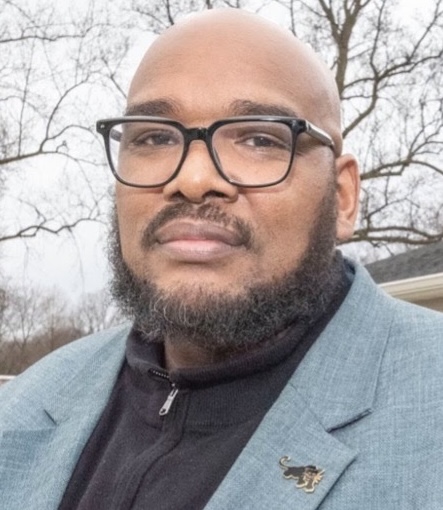By Rev. Terrance L Thomas, Contributing Writer
Quardricos Driskell’s essay “If Charlie Kirk Goes to Heaven” was written in response to Kirk’s recent death, asking readers to imagine the conservative activist finally learning to listen in eternity. But Driskell’s choice to center Kirk’s hypothetical redemption in the immediate aftermath of his death reveals something troubling about our theological priorities. Instead of asking “How do we grieve Charlie Kirk?” we should be asking: “What does the Gospel require of us in naming heaven, justice, and salvation when men who built careers on harming the vulnerable finally face their maker?”
Allow me just to name a thing: Charlie Kirk’s death is not a loss. His life’s work was built on mocking Black liberation, demonizing immigrants, advocating for racial violence, undermining LGBTQ lives, and stoking a political climate where authoritarianism flourished. He sowed division, profited from fear, and did harm to the vulnerable. His death, no matter how violent, does not erase that. His absence will not leave a hole in the lives of those he attacked, but most assuredly, his words continue to leave a lasting impact on those he harmed. So, the question is not “how do we grieve or even care about Charlie Kirk?”
Driskell’s essay tries to imagine heaven as a place where even Kirk finally humbles himself, finally listens, finally learns. But why must Kirk be placed in heaven at all? Jesus never described the kingdom that way. On the contrary, he warned: “Not everyone who says, ‘Lord, Lord,’ will enter the kingdom of heaven” (Matthew 7:21). Access to the kingdom was tied not to clever words or belated empathy but to how one treated the least of these, feeding the hungry, clothing the naked, welcoming the stranger, visiting the prisoner (Matthew 25:31, 46). Heaven is not an eternal diversity seminar for unrepentant oppressors.
Jesus himself told us in the parable of the rich man and Lazarus (Luke 16:19-31) that death is not a classroom for the powerful to learn belated lessons. The rich man ignored Lazarus in life, and when death came, it was too late to change. If you harden your heart to the cries of the poor in this life, you do not get a second chance in the next.
To put Kirk in heaven, or even suggest that he is there, is to repeat one of Christianity’s oldest sins: centering the redemption of the oppressor while silencing the cries of the oppressed. Slaveholders were told they could whisper a prayer and die saved, even as they died with blood on their hands and broken Black bodies at their feet. Segregationists were given communion without ever dismantling Jim Crow, all while strange fruit offered a jarring backdrop to their community gatherings. Colonizers were buried under crosses after stealing whole continents and murdering the population. All of it fueled by a theology of cheap grace, forgiveness without repentance, comfort without justice, and a theology of personal salvation without discipleship. Driskell’s essay echoes that same impulse.
Sadly, this impulse to redeem Charlie Kirk that we have seen over the past few days from Black Christians, especially clergy, is not new. Too often, Black people in general and Black Christians in particular are pressured into performative grief and reconciliation whenever someone with power dies, even those who spent their lives working against our liberation. I have watched preachers mourn Ravi Zacharias, Charles Stanley, and John MacArthur harder than they ever honored James Cone or Katie Cannon in death or lifted Jeremiah Wright in prayer when he fell ill. This is not accidental. It is a survival tactic passed down because our enslaved ancestors were not allowed to openly have an Exodus 15 moment when their Pharaohs died. But what needs to be understood is this: what may have once been a strategy of survival becomes, in our time, a distortion of our witness. Overextending grace to those who harmed us does not make us more humane or holy; it undermines the power of the Gospel we proclaim.
I want to be emphatically clear: I believe in redemption. My life is living proof of God’s restorative and redemptive powers. But mercy is not a loophole, and salvation is not sentimental. Biblical repentance looks like Zacchaeus paying back fourfold what he stole. It looks like Saul is not just confessing but laying down violence, suffering alongside those he once persecuted. If Kirk wanted heaven, he had the chance in life to repent, repair, and reorient his power toward justice. He chose not to. Death does not wipe the slate clean.
But let me also be equally blunt: I do not want a heaven that welcomes Nazis, Confederates, and white Christian nationalists who never turned from their ways. I already deal with them here, in real life. I have to watch them harm Black bodies in countless ways, pass voter suppression laws, demonize immigrants, mock the poor, and spit venom at LGBTQ children. Why would or should I need to endure them in eternity, too? If heaven is simply the empire with better lighting, where oppressors stroll in without repentance, then please, Lord, send me back as a frog or an eagle or a tree. Better to live in creation than in a counterfeit heaven where justice is optional.
The heaven I believe in looks different. It is the place where the first are last and the last are first, where Black mothers who buried their children because of racist state-sanctioned violence are comforted. Where queer and trans kids who were mocked and driven to despair and suicide find joy. Where the poor are lifted, the hungry are filled, and the merciful are blessed. That is the kingdom worth preaching. That is the heaven worth longing for. And if that means men like Charlie Kirk do not make it in, then I am at peace with that. Because Jesus already told us: not everyone will.





Good work, Rev. Thomas! Insightful!
The article was a sermon for me and the comments were equally a sermon for me.
#LordINeedTheeEveryHour
Thank you Rev TLT ✊🏾
Rev. Thomas, you have captured so many of our thoughts! Like you, I would not want to see those in heaven who have been oppressive to my ancestors, children. grandchildren, and me just because our skin color is darker. I heard a white pastor say, “Racism is not a skin thing but a sin thing.” Racism, hatred, misogynistic, etc. are not acceptable without any inward and outward show of confessions.
This astute and thoughtful analysis represents AME theological scholarship at its best. Pastor Thomas has given us an insightful commentary that speaks to the academy and to the streets with clarity and power.
Thank you Elder
An excellent poignant presentation of perspective…thank you.
In reading this excellent article, a number of issues came to mind: (1) some clergy rushed to anoint Charlie Kirk, others, including some who didn’t want his bad theology to go unchecked, rushed to expose his heretical beliefs, statements and actions. The legacy of Charlie Kirk is nuanced; he led hundreds if not thousands to either consider or commit to having saving faith in Jesus. That fact doesn’t gloss over all his horrendous theology on a number of issues, which Rev. Thomas broke down above…but it cannot be ignored. His oxymoronic Christian witness in that regard is not unlike many AME clergy and laity who work hard in the vineyard for Christ, yet actively embrace all kinds of sins some hidden, others not so much, so much so that one could question his salvation. We should not rush to redeem Kirk, we should accurately portray the dichotomy in all its fullness…and not rush to scapegoat, like the world so quickly does to us (2) If our goal is to be faithful to who Jesus is, we must balance Matthew 7:21 with Luke 23:42-43, where the thief at the last moment on the cross asks for forgiveness and Jesus grants it. By all human accounts, the thief should NOT get in…but it’s not up to us. It is clear now after Kirk’s murder, that on Israel at least, Kirk had been exposed to the truth and had begun to shift…only God knows what else. God made humanity stewards over the earth…we aren’t qualified to determine who goes to heaven and who doesn’t…which ought to inject some humility even as we inspect and expose somebody else’s sins. (3) Though made in God’s image, and though having the Spirit of God activated and empowering us through saving faith in Christ, Dietrich Boenhoffer reminds us that as long as we are in our flesh, everything about us is compromised, including our judgment about each other. How we perceive, analyze, and make suppositions is filtered through our flesh…which is not an excuse to ignore the facts, nor deny the reality that some should not get to go to heaven because of their sins, but recognize we are not God…even as we cling to the hope of undeserved grace when we die.
Also the question asked was never answered. The Gospel does not require us to do anything regarding judging those who die, whether they will go to heaven or not. Its a great question, but depending on who it is, we may or may not like the answer.
I refuse to believe the God of Justice is using heaven as a diversity seminar.
Also again we keep trying to put Nazi Kirk on par with other sins. Yes promoting genocide is worse than anything you think of.
Excellent piece
Well said my brother! 2 Timothy 3:5 “having a form of godliness but denying its power. have nothing to do with them” [NIV]. This hate filled Republican party and some Democrats too, will not see God unless they repent and change their ways.
Jesus sad it on his Sermon on the Mount Matthew 5:9 “Blessed are the peacemakers, for they will be called children of God.” [NIV]. MY BROTHER YOU HAVE DONE AN EXCELLENT JOB! I will definitely share this with my congregation.
Quardricos Driskell’s essay “If Charlie Kirk Goes to Heaven”
Who gets in is God’s call, not yours. God is the Judge. He know all. You are so in the flesh it is ridiculous! Colossians 3:2. New King James … ‘Set your mind on things above, not on things on the earth.’ Heaven is not like earth. Be careful what you ask for (But let me also be equally blunt: I do not want a heaven that welcomes Nazis, Confederates, and white Christian nationalists who never turned from their ways.). You may get it, and end up in a much worse place. Praying for you.
I am well aware of what I asked. I also stand by what I said.
I agree with Tia.You cannot speak for God. You do not know the state of grace or his relationship with God at his moment of death. Yours is a dangerous theology. It is not God’s desire that any should perish. His ways are not your ways or his thoughts your thoughts.
Come on now! “Heaven is not an eternal diversity seminar for unrepentant oppressors.” You better say that! Again and again! And not just for the folk in the back, but the ones on the front row claiming Christ with their eyes wide shut to the fact that God’s love can not and will not be mocked or manipulated when they’re called to be held accountable for what God saw them do in the land of the living, not for their sudden lightbulb/light switch moment of what it will truly mean for them being forever dead.
I’m with you on this! Excellent article.